Foxfield Railway
The Foxfield Railway is a preserved standard gauge line located south east of Stoke-on-Trent. The line was built in 1893 to serve the colliery at Dilhorne on the Cheadle Coalfield. It joined the North Staffordshire Railway line near Blythe Bridge. It is open at weekends and operates trains on Sundays, Bank Holidays and some Saturdays from April to October and Santa Special trains in December. It is home to the Knotty Coach Trust, The Foxfield Miniature Railway, a museum, café, bar, shop and hosts visits from the adjacent Olcote Animal Sanctuary the first three Sundays in a month.
| Foxfield Railway | |
|---|---|
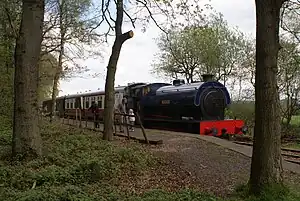 Wimblebury seen working a train at Dilhorne Park | |
| Locale | Staffordshire |
| Terminus | Caverswall Road |
| Coordinates | 52.97570°N 2.06454°W |
| Commercial operations | |
| Original gauge | 1,435 mm (4 ft 8+1⁄2 in) standard gauge |
| Preserved operations | |
| Stations | 2 |
| Length | 2+1⁄4 miles (3.6 km) |
| Preserved gauge | 1,435 mm (4 ft 8+1⁄2 in) standard gauge |
| 1893 | Opened |
| 1965 | Colliery closed |
| Preservation history | |
| 1965 | Railway preserved |
Foxfield Railway | |||||||||||||||||||||||||||||||||||||||||||||||||||
|---|---|---|---|---|---|---|---|---|---|---|---|---|---|---|---|---|---|---|---|---|---|---|---|---|---|---|---|---|---|---|---|---|---|---|---|---|---|---|---|---|---|---|---|---|---|---|---|---|---|---|---|
| |||||||||||||||||||||||||||||||||||||||||||||||||||
History
The Foxfield Railway was built in 1892-1893 to provide a link to the North Staffordshire Railway for the Foxfield Colliery. The railway was built by local labour provided by North Staffordshire Railway employees at weekends and supervised by the North Staffordshire Railway foreman plate layer Noah Stanier, using second hand material, again obtained from the North Staffordshire Railway.[1]
Preservation
When the colliery closed in August 1965,[2] local volunteers formed the Foxfield Light Railway Society to preserve the line. At first, passengers were taken in converted trucks up the formidable 1:19 to 1:26 gradient out of the colliery site at Dilhorne, accompanied by a tank engine.
Eventually, new coaches were purchased and a station was built at Caverswall Road, Blythe Bridge, half a mile from Blythe Bridge station. The service runs for 2+1⁄4 miles (3.6 km) from there to the top of Foxfield Bank. The last half mile into the colliery is currently being relaid to suitable standards for passenger trains to be re-introduced.
The museum is currently being renovated to tell the story of the preservation era.
Location
The original line left the Crewe to Derby Line a little west of the station. The link has been lifted, but several abandoned wagons can be seen in the old sidings from passing trains. A station and depot have been built at Caverswall Road, half a mile north of Blythe Bridge railway station along Blythe Bridge Road.
Although located in Staffordshire, the railway has been used for the filming of sequences for the BBC Television series Cranford, which is set in Cheshire. The railway featured in the two-part Christmas special that was first broadcast in December 2009. Judi Dench, who played the part of Matilda 'Matty' Jenkyns, invited several of the main characters to ride on the train in an attempt to alter their opinions about the benefits of the railway being extended into the town of Cranford.[3]
The station at Caverswall offers visitor facilities such as a Buffet serving hot and cold food and drinks and a Real Ale bar "The One Legged Shunter". Also a museum building displaying a variety of artifacts relating to local railways and locomotives currently out of service. The adjacent Olcote Animal Sanctuary has an enclosure next to the miniature railway where animals can be found the first three Sundays in a month.
The railway operates Sundays and Bank Holidays from April to October and Santa Special trains during December.
Locomotive fleet
The Foxfield Railway has the largest collection of standard gauge steam locomotives in Staffordshire, most of which are of industrial origins. Also a reasonable sized collection of industrial diesels and a recently arrived (August 2020) class 142 Pacer no 142055 in working order.
Operational steam locomotives
| Origin | Number/Name | Wheel arrangement |
Class | Notes | Photograph |
|---|---|---|---|---|---|
| Hawthorn Leslie and Company | 3581 Marston, Thompson & Evershed No. 3 | 0-4-0ST | Works number 3581 of 1924.[4] Returned to service December 2021 following long term restoration. |  | |
| Kerr Stuart | 4388 | 0-4-0ST | 'Witch' | Built in 1926. Overhaul commenced following a change in ownership to Fred Dibnah's son in June 2020, and was completed in July 2022. Boiler ticket expires 2032. | 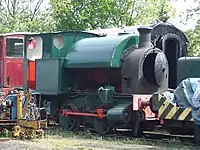 |
| W. G. Bagnall | 2623 Hawarden | 0-4-0ST | Built in 1940. Returned to service in 2023 after major overhaul. Boiler ticket expires 2033. | 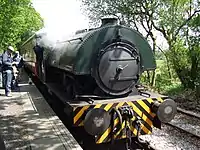 | |
Steam locomotives off site
| Origin | Number/Name | Wheel arrangement |
Class | Notes | Photograph |
|---|---|---|---|---|---|
| Hunslet Engine Company | 3839 Wimblebury | 0-6-0ST | Austerity 0-6-0ST | Built in 1956. Returned to service in July 2017 after 10-yearly overhaul. On loan to the Avon Valley Railway. | 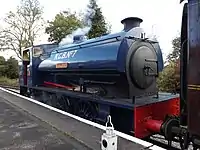 |
| Andrew Barclay Sons & Co. | 1984 Boots No. 1 | 0-4-0F | Built in 1930. Offsite on long term loan to West Somerset Railway, awaiting restoration. | ||
| Robert Stephenson and Hawthorns | 7063 Eustace Forth | 0-4-0ST | Built in 1942. Entered service in July 2017 following extensive overhaul. On loan to Peak Rail. | 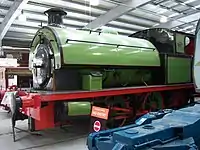 | |
Steam locomotives undergoing overhaul or restoration
| Origin | Number/Name | Wheel arrangement |
Class | Notes | Photograph |
|---|---|---|---|---|---|
| Beyer, Peacock & Co. | 1827 | 0-4-0ST | Built in 1879. Re-entered service during 2013 and withdrawn for overhaul in 2022. | .jpg.webp) | |
| Hunslet Engine Co. | 3694 Whiston | 0-6-0ST | Austerity | Built in 1950 to the famous 'Austerity' design of which 485 examples constructed between 1943 and 1964. Worked all its commercial life in the Lancashire coalfield before coming to Foxfield in very poor condition on 26/03/83. Overhauled and entered service on 19/04/86 and constant performer in traffic apart from two further overhauls from 1994–96 and 2006-2010. Last in steam on 31 December 2020 when current boiler certification expired. Complete new saddletank delivered to site in April 2021 and new smokebox / door in course of installation in May 2021. All 181 boiler tubes and all 130 off rigid and flexible roof stays removed November / December 2021. Boiler lifted from frames in April 2022. Much copper side stay replacement completed November 2022. Frames lifted off the wheels in early February 2023. Hoped for return to traffic in 2024. | .jpg.webp) |
| Avonside Engine Co. | 1563 John Paton | 0-4-0ST | Built in 1908. Undergoing long term restoration. | 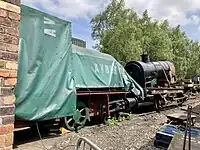 | |
| Peckett and Sons | 1567 Ackton Hall No 3 | 0-6-0ST | Built in 1923. The only surviving example of an inside cylindered 0-6-0 Peckett. Acquired from the National Coal Mining Museum in July 2015. Dismantled for restoration. | ||
| W. G. Bagnall | 3059 Florence No. 2 | 0-6-0ST | Built in 1953. Returned to steam in 2008 after an extensive restoration. Withdrawn at end of 2015 for overhaul which is underway. | .jpg.webp) | |
Stored steam locomotives
| Origin | Number/Name | Wheel arrangement |
Class | Notes | Photograph |
|---|---|---|---|---|---|
| North Staffordshire Railway | 2 | 0-6-2T | NSR New L Class | Built at Stoke works in 1923. On static display in the museum building. Transferred from the National Railway Museum to Foxfield and arrived at the railway on 21 April 2016. | 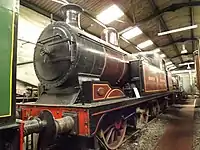 |
| Haydock Foundry | C Bellerophon | 0-6-0WT | Built in 1874. The oldest locomotive in the collection. Boiler ticket expired in 2018. Owned by the Vintage Carriage Trust. | 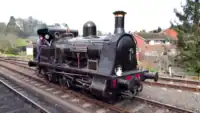 | |
| Robert Heath & Sons Ltd. | 6 | 0-4-0ST | Built in 1886, rebuilt in 1934. Purchased by the Knotty Coach Trust in 2020 who are fundraising for the resumption of its overhaul. | 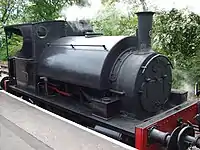 | |
| Peckett and Sons | 933 Henry Cort | 0-4-0ST | W4 Class | Built in 1903. On static display in the Museum building awaiting overhaul. | 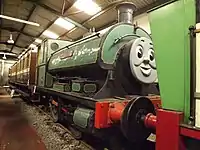 |
| Peckett and Sons | 1803 Ironbridge No. 1 | 0-4-0ST | Built in 1933. Awaiting overhaul, on display in the museum. | 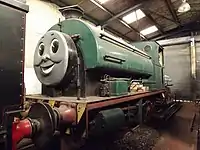 | |
| Peckett and Sons | Works No. 2081 No. 11 | 0-4-0ST | OY Class | Built in 1947. Awaiting overhaul, on display in the museum. |  |
| Manning Wardle | 2107 The Welshman | 0-6-0ST | Built in 1890. Stored at Foxfield Colliery awaiting restoration. On Loan from the National Coal Mining Museum | ||
| W. G. Bagnall | 2221 Lewisham | 0-6-0ST | Built in 1927.[5] Stored awaiting overhaul after its boiler ticket expired in late 2007. | ||
| Dübs and Company | No. 4101 Dubs | 0-4-0CT | Dübs and Company crane tank | Built in 1901. Returned to steam in September 2010 after major restoration. 2010 winner of the Heritage Railway Association John Coiley award for Locomotive restoration. Boiler ticket expired in 2020. |  |
| Kerr Stuart | 4127 Moss Bay | 0-4-0ST | Built in 1920. On static display in the museum building. | 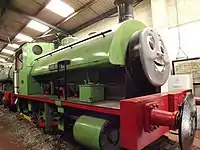 | |
| Sentinel Waggon Works | 9535 | 0-4-0 | Built in 1952. On static display in the yard. However, restoration is being considered. | 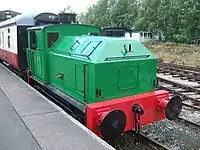 | |
Operational diesel locomotives
| Builder/class | Number/Name | Wheel arrangement | Notes | Photograph |
|---|---|---|---|---|
| Thomas Hill | 111C | 4wDH | Restored in 2014. | |
| W. G. Bagnall | 3150 Wolstanton No. 3 | 0-6-0DM | 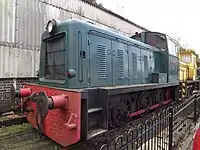 | |
| Bagnall | 3207 Bagnall | 4wDH | 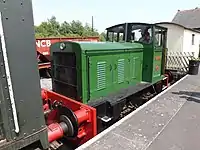 | |
| Kerr Stuart | 4421 | 6wDM | Worked its first passenger trains at the Staffordshire Steam Weekend 2022.[6] | 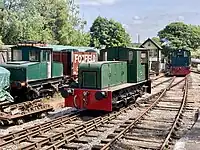 |
| British Rail Class 142 | 142055 | Two car unit | Arrived in 2020. Being commissioned for service. | 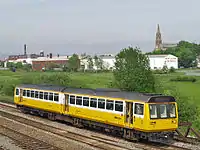 |
Diesel locomotives undergoing overhaul or restoration
| Builder/class | Number/Name | Wheel arrangement | Notes | Photograph |
|---|---|---|---|---|
| Thomas Hill | 103C | 4wDH | Undergoing restoration off site. Originally converted from a Sentinel 4wWBT steam locomotive, like Sentinel 9535. | |
| Andrew Barclay | 486 Clive | 0-6-0DH | In process of being returned to working order. Bodywork repaint in BR warning yellow as per Central Electricity Generating Board livery completed 5 November 2016. Lettering saying CEGB, Meaford Power Station and varnishing to take place and the frames will be blacked with red wheels. New engine mounts have been fitted and the engine run up a number of times (latest February 2021) and in order. |  |
| English Electric/Drewry Car Co. | WD820 | 0-4-0DM | Used on the D-Day landings in 1944. Undergoing overhaul. |  |
| Janus class | 2868 Ludstone | 0-6-0DE | Restoration started in 2015, which mainly focused on cosmetics, and the prevention of further corrosion to the locomotive. Mechanical work is now underway. | 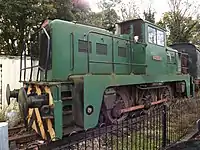 |
| Ruston and Hornsby 88DS | 408496 Shanks No. 444 | 4wDM | Undergoing long term overhaul which began in February 2017. Engine lifted out in November 2017 along with most of the cab. Gradual reassembly underway. | 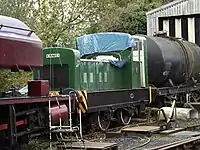 |
| Ruston and Hornsby 165 | 424841 Roman | 0-4-0DE | New generator bushes fitted along with new batteries. New starter motor sourced and waiting to be fitted. Bodywork has also received some attention. | 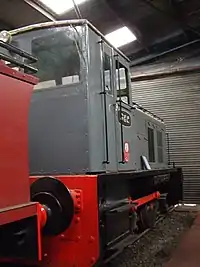 |
Stored diesel locomotives
| Builder/class | Number/Name | Wheel arrangement | Notes | Photograph |
|---|---|---|---|---|
| Motor Rail Simplex | 2262 Helen | 4wDM | Stored awaiting restoration. |  |
| Ruston and Hornsby 48DS | 242915 Hercules | 4wDM | A narrow gauge Ruston diesel locomotive that is attached to a standard gauge chassis. Stored awaiting overhaul. |
Electric locomotives
| Builder/class | Number/Name | Wheel arrangement | Notes | Photograph |
|---|---|---|---|---|
| English Electric | 1130 | 4wBE/WE | Non-operational due to a lack of batteries or overhead lines on site. | 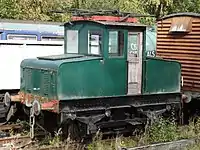 |
Passenger carriages
The railway has a collection of carriages from a wide range of years which are used to take passengers up and down the line.
- Mk 1 Corridor Second (SK) No. M25607. (Operational, overhauled in 2019).
- Mk 1 Brake Corridor Second (BSK) No. M34672, named 'Eric Swift' after a member who left a legacy which financed the overhaul of the railway's coaching stock. Operational following a major in-house rebuild, including conversion of the luggage area to a on train bar in 2021
- Mk 1 Tourist Second Open (TSO) No. M4762. Operational following overhaul and completion of accessible conversion at the Llangollen Railway in 2020
- Mk 1 Tourist Second Open (TSO) No. M4243 undergoing major rebuild following discovery of major corrosion, Privately Owned.
- Mk 1 Corridor Second (SK) No. M25225. Stored at Dilhorne Park awaiting major restoration. Privately Owned.
- LMS Theatrical Scenery Van No. 37519 (converted to the passenger carrying Bass Belle Observation Bar Car). On static display but eventually planned to be overhauled to working order.
- LMS third class gangwayed vestibule coach No. 27249. (Stored awaiting overhaul).
- LTSR PMV No. 1 (rebuilt by MR in 1920 from Composite vehicle). (Stored out of use. Previously used as Kitchen vehicle).
- The NSR Rolling Stock Restoration Trust
In 2008 a small group was formed with the aim of restoring the two surviving North Staffordshire Railway 4-wheeled coaches, with a long term aim of recreating a proto-typical Victorian train that would have once operated in the local area. The Knotty Trust, as it has become known as, was registered as a charity in 2009 and in 2012 received a £30,000 grant for the completion of the first vehicle (no. 127).[7] This was completed at Stanegate Restorations, who have become a major supporter in the recreation of a Knotty Train.[8] Since then the collection has grown to include other former 'Knotty Coaches' that have been discovered, as well as other historically important vehicles.
| Number | Type | Status | Notes |
|---|---|---|---|
| 228 | First (FY) | Undergoing Restoration | Owned by the NSRC, based at the Churnet Valley Railway. Given to the KCT on a 99-year loan in 2014, and so an appeal has now been launched for this vehicle's restoration.[9] This is the next vehicle which is to be restored by the trust and also the final one to be restored as part of the Knotty Heritage train. |
| 61 | Third (TY) | Operational | The second vehicle to have to have been restored by the KCT. Entered service in August 2014, after a visit to the CVR to launch the "Project 28 Appeal". |
| 127 | Third (TY) | Operational | The first vehicle to have to have been restored by the KCT. Entered service in August 2014, alongside 61. |
| 23 | Brake Third (TB) | Operational | One of three newly discovered vehicles found in woodland alongside Rudyard Lake, though no number has presently been identified. These vehicles were recovered in October 2014, with the Brake Third being sent away immediately for restoration to begin at Stanegate Restorations.[10] The coach was renovated as part of the "ABC" (Accessible Brake Coach) project[11] and was launched into traffic in May 2019. |
| First (FY) | Stored | One of three newly discovered vehicles found in woodland alongside Rudyard Lake, though no number has presently been identified. These vehicles were recovered in October 2014, and put into store whilst other projects take priority.[10] | |
| First (FY) | Stored | One of three newly discovered vehicles found in woodland alongside Rudyard Lake, though no number has presently been identified and only half of this vehicle really exists following numerous years in the open. These vehicles were recovered in October 2014, and put into store whilst other projects take priority.[10] | |
| MR Six-wheel Composite Luggage (CLZ) | Stored | One of three former Midland Railway vehicles donated to the KCT by Foxfield. One of only three survivors, the other two having been restored at the Keighley & Worth Valley Railway and National Railway Museum respectively. Luggage/First/Third class compartment carriage, no recognisable number has been found on the body to date. This vehicle is planned to be restored once a fully operation Knotty Train is operational. | |
| 1108 | MR Bogie Third (T) | Stored | One of three former Midland Railway vehicles donated to the KCT. Whilst only the body survives, the vehicle is planned to be restored once a complete Knotty Train is operational. |
| 348 | MR Picnic Saloon (FOZ) | Stored at [Peak Rail] | One of three former Midland Railway vehicles donated to the KCT. Whilst only the body survives, a former SR PMV has been designated for use as part of the vehicle's restoration. To be done once a complete Knotty Train is operational. |
| NSR Brake Van | Stored | The sides from an original NSR Brake Van were found being used as a barn on Kingsley Moor, including the original painted Knotty emblem. These have been recovered and are now stored at Foxfield. | |
| 4384 | LMS Covered Carriage Truck (CCT) | Stored | Donated to the trust to assist with the eventual restoration of the CLZ. |
| 731945 | LMS Goods Brake Van | Stored | Frame only. To be modified for use with the ABC. |
| 1703 | SR Parcels & Miscellaneous Van (PMV) | Stored | Donated to KCT. Frames to be used for Saloon 348. |
Freight wagons
The railway also has a selection of freight wagons, in order to preserve what remains of Britain's industrial history.
These include the ubiquitous '16 ton' mineral wagons which were associated with coal trains and the railway in the 1960s, examples of 21 ton hopper wagons also used for coal traffic and a rare ex Central Electricity Generating Board 21 ton tippler wagon that worked all its commercial life in the North Staffordshire coalfield.
References
- "Foxfield Railway - HISTORY OF THE FOXFIELD RAILWAY". Archived from the original on 25 May 2009. Retrieved 10 May 2009.
- "Foxfield Railway - A Brief History of the Foxfield Railway". Archived from the original on 28 March 2017. Retrieved 27 March 2017.
- "This is Staffordshire - 3 June 2009". thisisstaffordshire.co.uk. Archived from the original on 15 December 2009. Retrieved 24 April 2018.
- Industrial Locomotives: including preserved and minor railway locomotives. Vol. 15EL. Melton Mowbray: Industrial Railway Society. 2009. ISBN 978-1-901556-53-7.
- "Foxfield Railway - Help us restore 'Lewisham'". Archived from the original on 28 March 2017. Retrieved 27 March 2017.
- "Kerr Stuart Launch & Victorian Weekend – 3rd & 4th September". Foxfield Railway. Retrieved 13 September 2022.
- Knotty Trust Archived 25 December 2014 at the Wayback Machine
- "Stanegate Restorations and Replicas". www.stanegaterestorations.co.uk. Archived from the original on 3 March 2016. Retrieved 24 April 2018.
- "Knotty Coach 228 Appeal". churnet-valley-railway.co.uk. Archived from the original on 16 October 2016. Retrieved 24 April 2018.
- Trust, The Knotty Coach. "News". www.knottycoachtrust.org.uk. Archived from the original on 22 July 2016. Retrieved 24 April 2018.
- Trust, The Knotty Coach. "Brake Coach". www.knottycoachtrust.org.uk. Archived from the original on 21 January 2018. Retrieved 24 April 2018.